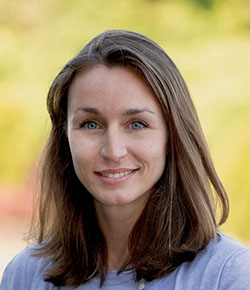 “Physical Perturbations to the Gut Microbiota During Health and Disease,” by Carolina Tropini, PhD, Assistant Professor, School of Biomedical Engineering and Department of Microbiology & Immunology, UBC.
“Physical Perturbations to the Gut Microbiota During Health and Disease,” by Carolina Tropini, PhD, Assistant Professor, School of Biomedical Engineering and Department of Microbiology & Immunology, UBC.
The consortium of microbes living in and on our bodies is intimately connected with human biology and deeply influenced by physical forces. Despite incredible gains in describing this community, and emerging knowledge of the mechanisms linking it to human health, understanding the basic physical properties and responses of this ecosystem has been comparatively neglected. Most diseases have significant physical effects on the gut; diarrhea alters osmolality, fever and cancer increase temperature, and bowel diseases affect pH. Furthermore, the gut itself is comprised of localized niches that differ significantly in their physical environment, and are inhabited by different commensal microbes. Understanding the impact of common physical factors is necessary for engineering robust microbiota members and communities; however, our knowledge of how they affect the gut ecosystem is poor.
We are investigating how changes in osmolality affect the host and the microbial community and lead to mechanical shifts in the cellular environment. Osmotic perturbation is extremely prevalent in humans, caused by the use of laxatives, lactose intolerance, or celiac disease. In our studies we monitored osmotic shock to the microbiota using a comprehensive and novel approach, which combined in vivo experiments to imaging, physical measurements, computational analysis and highly controlled microfluidic experiments. By bridging several disciplines, we developed a mechanistic understanding of the processes involved in osmotic diarrhea, linking single-cell biophysical changes to large-scale community dynamics. Our results indicate that physical perturbations can profoundly and permanently change the competitive and ecological landscape of the gut, and affect the cell wall of bacteria differentially, depending on their mechanical characteristics.
Monday, September 9, 2019 at 2:30 pm, LSC#3
Host: Dr. Christian Kastrup